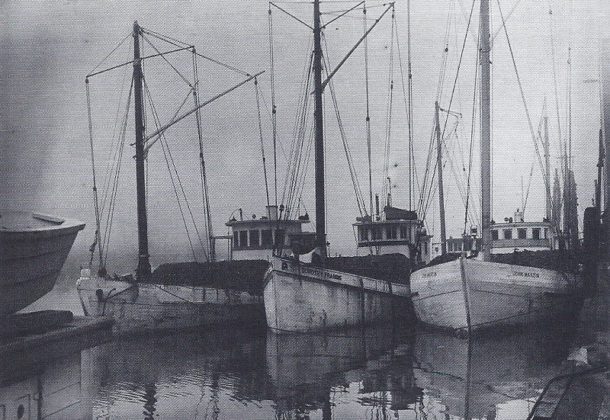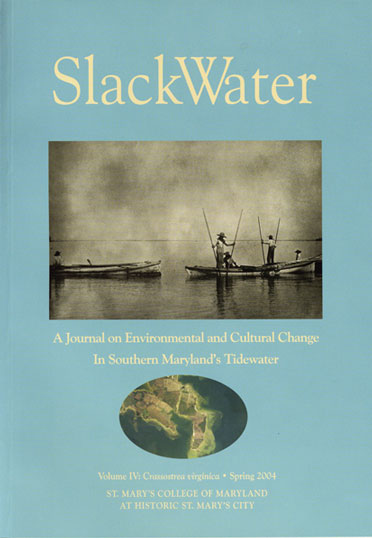Insider’s Look at Potomac Oyster Wars

The SlackWater Center at St. Mary’s College of Maryland is a consortium of students, faculty, and community members documenting and interpreting the region’s changing landscapes. Oral histories are at the core of the center, which encourages students to explore the region through historical documents, images, literature, and scientific and environmental evidence. Some of this work has been published in the print journal SlackWater, some of which is online and some published here. The work below was first published in SlackWater Volume IV Crassostrea virginica in spring 2004.
This essay has been adapted and shortened.
By Clem Cheseldine as told to Andrea Hammer
“Do you think of yourself as a pirate?” I asked Clem Cheseldine one March afternoon after he’d talked about experiences as a member of the Mosquito Fleet. He laughed and shrugged. “Guess so,” he said, pausing. “But I never took nothing that wasn’t mine, never touched another man’s oyster bars, and I never killed nobody.”
Cheseldine leaned back in his armchair, stocking feet propped up on an ottoman, and occasionally gestured in the direction of White Neck Creek or the Wicomico River as he explained the difficulties of making a living on the water.”
My name is Clem Cheseldine. I’ve been a waterman all my life. I started out when I was eleven, and when I was sixteen I went out on my own. When I was young I used to go on holidays and Saturdays and things with my daddy, he was a waterman, and from then on that’s the only job I’ve ever had. I stayed in the river about seventy-some years.
I quit about three years ago. I had to leave, I couldn’t stand it. What happened to the oysters the last ten or twelve years got too hard for me, but I crabbed up until the last two or three years. All my uncles and all was watermens, Uncle Walter and Daddy and … Well, back then wasn’t nothing to do but the river. And farming. Wasn’t nothing to that either. I tried to farm. One time I had a house of tobacco and got five cents a pound for it and said, “That’s enough for me. I’m going out and catch some cheap oysters.” Couldn’t sell them neither, half the time.
Can you tell a bit about the Oyster Wars?
I was out there in all of it, but I think the Oyster Wars is over talked about.
Most of the watermens, they got along with one another just as good as anybody, as regular people. But the policemen and the politicians are the ones that had the oyster war. But it wasn’t among the watermen that was out there cause they was just as friendly as they could be.
Course, I’ve seen shooting out there, and I’ve been shot out myself three or four times (laughs). The worst one I remember was when they killed that fellow [Berkeley Muse] from Colonial Beach out there dredging in the nighttime. And he was a spectator, he wasn’t a waterman, he was a furniture man over in Virginia, but he just went out with his friend [Harvey King] to watch him. And I suppose the policemen had been watching King and one thing and another. It was in the nighttime, and they claimed the boat was running from ’em and they shot the boat. Was three policemen and one or the other of ’em killed him, I don’t know which it was.
The Mosquito Fleet, they were a bunch of these small, right fast boats – they was fast then but now they’re nothing – and they’d go out in the nighttime and go up here into the Wicomico and different places and run the oysters on down the river and sell em or plant em or whatever they could do with em.
I was part of the Mosquito Fleet. I wasn’t a real part of it, but I was some of it. Course, I did plenty of nighttime dredging. Daytime too (laughs). Everybody out there did at times.There were times the police’d be a little easy on you, when the weather got bad and oysters was hard. They would give you a little break for a week or two for [illegal] dredging and one thing and another. And when the buyers got loaded up again, the police’d come back out there and let you know it was time to quit for a while.

Copies of this Slackwater Volume IV are available at http://www.smcmbooks.com/.
This [pirating] was mostly done in bad times. You could sell real good oysters most anytime, but the other grades of it they wouldn’t buy – if it was poor, or had mussels or blisters on it. Well, actually you did it when the buyers wanted. They controlled the market, and what was best for them, that’s what went on.
When was the Mosquito Fleet most active?
That’s been over for about twenty-five years, I guess. Laws got a little tighter and all, and they was a bunch of young boys, you know, they’ll try anything. Like everybody else, they were trying to make a dollar, make a good living, that was the main thing. I won’t say a good living, but make a better one.
One time I was out here, it was in the summertime, the latter part of the season, and I was oystering right in front of the house. I strayed up on the end of the bar away from the channel cause I figured if a policeman come out he was going to be down in front of the channel and I would miss him. Anyhow, I heard this boat running and I says, That boat don’t sound right to me. Right then I didn’t have but about three or four baskets I’d tonged – we’d tong em in baskets sometimes – and he got almost on top of me, and I started going around, throwing them overboard, and he kept trying to catch me. Every time he’d get close I’d throw a bushel basket and knock water in the boat on him. I finally got down to half a bushel, and then I got them out of the boat, and then I started a running. I run from here clear on down to Waterloo. Looking back, watching him, I run into a duck blind down there and got hung up into that. I fell down into the boat, but I got back up. I didn’t have too much more gasoline left, I was going to run down to Muddy Creek – there’s shallow water down there – and I said, If I do that I’m liable to run out of gasoline and can’t get back, so I’m going to turn around and come on back home. They had me arrested. I went on into town, saw a lawyer, and got out of it. Back then that was fairly common.
This used to be one of the best places in the river – this and the Chesapeake Bay, and it’s getting the same: it’s polluted, and the pollution’s running off the land, and from nuclear plants, and sewage and everything else, it’s working on down the river, and you can’t stand but so much of that.
No regrets. Not a day.
More From The SlackWater Center
To accompany SlackWater on a visit to St. George Island, read Circumstantial Evidence Part I here and Circumstantial Evidence Part II here.
Also from SlackWater: Explore the Chesapeake Bay oyster’s history and the maritime village of Wynne in southern St. Mary’s County.
























Hello,
I am currently working on some family research for a friend of mine and discovered that his 2X Great Grandfather, John Bryant (1866-1940), was a well-known oysterman around the Washington, D.C. area. I was hoping someone might be able to shed some light on him. I know that, at one point in time, he owned three vessels. The first two were sail powered and the last one was engine powered and named “Edith Marcy”, which he gave to the Washington Sea Scouts around 1935; five years before he passed in 1940. If anyone knows of any more information about John and could pass it on to me, I would greatly appreciate it. Thank you for your time and effort.
Sincerely,
Sean Cunningham